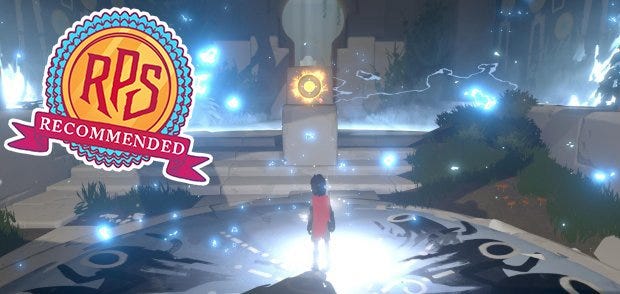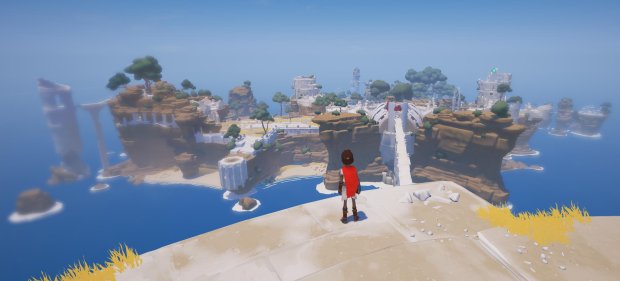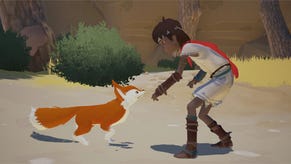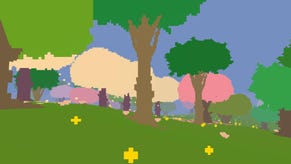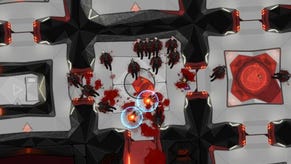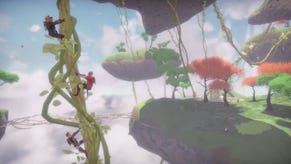Wot I Think: gorgeous combat-free action puzzler RiME
Many reasons to Rime
A third-person exploration game that eschews combat to finally prove Tomb Raider never needed the guns. RiME [official site] is a beautiful, magical game - here's wot I think:
RiME (let's switch to 'Rime' for sanity's sake) is a compelling and beautiful game, a distillation of the non-combat sides of classics like Tomb Raider, Prince Of Persia: Sands Of Time, and a good dose of Fumito Ueda's Sony games, delivering elaborate third-person exploration and adventure without an attack button. And without any instructions. What makes Rime such a peculiar project is it requires its audience to already be fluent in the vocabulary of its genre, to have a complete set of assumptions about what a such a game expects of its player.
Which is, in many ways, brilliant. Having spent so much of my life playing the games that inspired it - Ico, multiple Tomb Raiders, a dose of Zelda - I'm fortunate to have the fluency to know what it wants me to do. I can only imagine what a strange experience it must be for anyone who is not so fortunate. Rime offers no introduction, no context, and certainly no tutorial. Instead it plonks you down on a stunningly rendered cartoon island without so much as a hello, and leaves you stood there. You can run off in multiple directions, do many different things, but at no point does it tell you what they should be nor why you're doing them.
I can see this both delighting and infuriating. It delighted me, for the most part, because it felt like I'd been practising for this for years. Two markers in a wall that look like they might be keyholes, so off I run, jump, climb and swim to find two key-like things to pop in there. Why? I'll find out when the door opens, I guess. An empty looking pool? Find a way to fill it with water, most probably, then find out why I did it. How do I make those pots disappear? Maybe I sing to them. Which way next? Well, there's a fox sat over there, yapping away, so it's probably that way.
In fact, the elusive fox guide doesn't turn up until a little way in, when you stumble into incarnating him through Rime's peculiar game-only logic. This approach permeates all, with the ability to forge vital tools by lining up objects from particular perspectives, then their impossibly fusing together to create something new just because you looked at them in a straight line while they glowed. It never tells you that's a thing you need to do - you just figure it out because it seems a possibility.
And it constantly captivated me this way. The seemingly enormous opening island is only a fraction of what's there to discover in this constantly evolving setting, themes and approaches changing as you progress, the internal narrative only whispered by the locations. In fact, the choice of direction can often feel almost too much, knowing that if you accidentally progress along the main path, you may well end up missing out on stretches that lead to the abundance of special collectible bonuses hidden away in secret chambers and caves. There were some moments where the ambiguity felt a little much, and I desperately wished for - at the very least - a map to look at to work out where I was in relation to where I'd been. (Although as you progress, and the paths begin to play more tricks on you, you can see why a map might not always have been possible.)
Who you are, who the fox is, why you're exploring these ruined structures and abandoned, overgrown once wondrous buildings, seems unimportant once you're deeply embedded in the complete joy of exploring, tinkering, discovering and overcoming.
And while there's no attack button for your character, that doesn't mean there aren't dangers. It's just that the game approaches threats in a far more interesting way than pressing X to swing a stick: you must use the environment, discover the potential of magical objects (often hinted at in gorgeous murals painted on the game's crumbling walls), or even change the weather through elaborate machines. Fortunately it has the sense to realise you don't want to feel helpless, and doesn't bombard you with enemies - they're an occasional extra, an additional challenge to the core puzzles of exploration.
As I've mentioned a couple of times, it's a wonderful-looking game. Something it could have shown off even better if it weren't so frequently putting you in the dark. Day/night cycles always have to follow a simple rule: night has to look as good as day. It doesn't here. It's infuriatingly dark, and you just can't see as well. However, for reasons I shan't share, this isn't a problem that persists deep into the game. Still, there are far too many dark corridors where some subtle lighting could have made for a far more evocative time. I say that, but there's one heck of an exception - toward the end of the game there's a bleakly lit sequence in torrential rain, and it might be the most beautiful moment of all.
More seriously, there are some frustrating issues with stuttering. Even after switching down the settings from top to middle, on a machine that's more than powerful enough to be at full whack, I still regularly see the framerate wavering between 40 and 60, the occasional juddering result distracting. And it's being widely reported that the same is true for many players, across many graphics cards. A patch will come, we're told, but the developers are still asking people to submit specs and so forth so it may yet be a while. It's not disastrous, but it makes busier scenes a little uncomfortable.
Back to the positives. Special mention must go to the music. The score is exceptional, sweeping orchestral pieces that further illustrate the scenes, really adding an enormous amount to the experience. I'm usually one for switching a game's music down or off, but definitely not in this case - it would be to really miss out.
I feel like Rime will be a game celebrated by those who already love the third-person genre, those au fait with Tomb Raider-style climbing and jumping, and environmental puzzles. It's certainly celebrated by me. But I wonder if it might have a harder time winning the affections of those who aren't already sold on the concept, simply because of the swathes of assumptions it makes about a player's fluency. Or maybe I'm being patronising? I'm not entirely sure. What I do know is I've had such a splendid time with Rime, so deeply enjoyed its expansive and sumptuous world, and found myself not missing the attack button at all. Not when there's a sing/shout button that does so many more interesting things.
RiME is out now for Windows via Steam for £30/$30/34€. (Quite why it's £7 more expensive in the UK than US we're not sure.)
